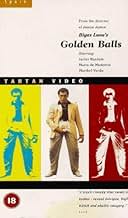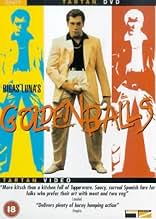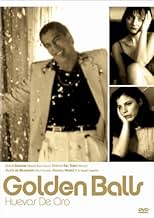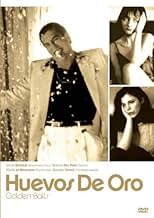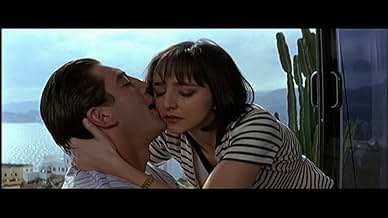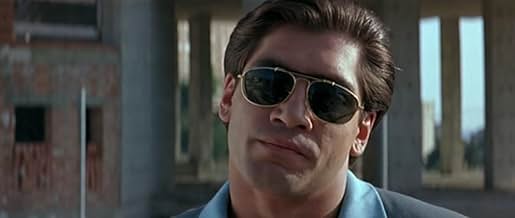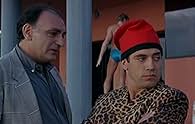A construction worker uses his charm and bravado in an attempt to attain enough finances to build his dream project.A construction worker uses his charm and bravado in an attempt to attain enough finances to build his dream project.A construction worker uses his charm and bravado in an attempt to attain enough finances to build his dream project.
- Awards
- 4 wins & 3 nominations total
Alessandro Gassmann
- El amigo de Melilla
- (as Alessandro Gassman)
Benicio Del Toro
- El amigo de Miami
- (as Benisio Del Toro)
Francesco Maria Dominedò
- El Mosca
- (as Francesco Mª Dominedo)
Francisco Casares
- El productor
- (as Paco Casares)
- Director
- Writers
- All cast & crew
- Production, box office & more at IMDbPro
Featured reviews
This film is Spanish. This statement is not as obvious as you might think. Bigas Luna makes films so rich in Spanish cultural references that it is true that without previous knowledge, or better yet experience, of Spain then much of the film's charm will be lost. He parodies the stereotypes of spanish culture- the macho male most obviously, but there are numerous others- in such a way that anyone who accuses the characters of being over the top and unbelievable would very nearly be fully justified, if it wasn't that they are so instantly recognizable. Javier Bardem's character has wonderfully kitsch taste, most notably his attire and the obsession he has with Salvador Dali (to the point of outlining the famous 'drawers' across the bodies of all the women in his life). This goes a long way to creating the visual style which is somehow spot on for the mediterranean coast. The story itself is quite touching in the end, as a man of great passion and ambition rises from having nothing to having all he desires before the inexorable decent commences. There is much symbolism in this film for those who enjoy it. For example Bardem aims to erect the tallest building in town, yet as it fails and crumbles, so does his sexual potency. This film is admittedly an aquired taste, not for people who thrive on the tried and tested Hollywood formulae, unless they are willing to explore into the exotic and foreign world of Bigas Luna.
Bigas Luna's film is far from perfect, but I found it a sharp and caustic portrait of a particular lifestyle and a particular time and place in recent Spanish history - the 80's construction boom, the new rich and their unabashed cheesiness, the macho ibérico...Bardem's character is spot on, and he plays the role incredibly well. In fact, all of the performances are very good; it is the directing that occasionally fails the story. It does at times feel like the sex scenes outweigh all others, but I don't feel that they are gratuitous. Other than expensive accessories and a lust for skyscrapers, it is what Bardem's character spends most of his time and energy on. Maria de Medeiros and Maribel Verdú are excellent, especially the latter, who delivers a pretty brave performance. The cinematography is really beautiful and well conceived for each stage of the story. And it contains what must be one of my favorite cinematic moments in a long time...Bardem doing a Julio Iglesias karaoke number in a leopard-print robe, black speedo and Catalan barretina.
If the darkly comic tone of this film strikes you as a bit odd for what on the surface is a straight forward young-man-on-the-make drama, welcome to the world of Bigas Luna. What this is really is a satire on supposed masculine virtues in Latino culture. The main character, a wannabe real estate mogul played by Javier Bardem, throughout the film achieves material ambitions and rising to dominate others in classic alpha dog fashion, yet his victories seem hollow and shallow. This is all intended, but Luna was not aiming to create a morality play here. He just wanted to take cheap shots at talentless hacks who succeed on sheer chutzpah, and at cultures who lionize them for their successes however achieved. The main character could have been any ambitious rhymes-with-Rick in any field. One gets the idea that he might even have been based on somebody Luna knew from the film business...
Bigas Luna's 1993 film HUEVOS DE ORO ("Golden Balls/Eggs", a title punning on both the goose that laid the golden eggs and a tough guy's balls of steel) depicts the rise and fall of Benito Gonzalez (Javier Bardem), a young Spanish construction worker who becomes an affluent real estate developer on the Mediterranean coast.
After being jilted by his first girlfriend (Elisa Tovati), who leaves him for his best friend, Benito develops a mania for building the tallest building in Benidorm, which may be seen as little more than an enormous phallic symbol flaunting his manhood. Obsessed with this big construction project, his lust for his next woman, Claudia (Maribel Verdú) takes second place to having her sleep with potential investors to win them over. Benito then marries a banker's daughter, Marta (Maria de Medeiros) to have access to her father's funds. Benito lives a life of sexual excess and enormous consumption of food, especially the Alicante sweet known as torron. Like some of the work of Almodovar, Bigas Luna clearly likes riffing on Spanish stereotypes and regional differences.
Ultimately, however, Benito's hubris leads to his downfall. This protagonist is certainly an odious guy, but -- though I won't spoil the ending -- the depths to which he is ultimately sunk inspire a perverse sympathy in the viewer. Years went by between my first viewing of this film and the second, but in the interim I would often look back on this film's plot and ending scenes, thinking of how sad it was to lose everything and end up that way.
HUEVOS DE ORO isn't an especially deep film, but that dramatic arc, hewing very close to classical notions of tragedy, is impressive and I'd say this film is worth a watch.
After being jilted by his first girlfriend (Elisa Tovati), who leaves him for his best friend, Benito develops a mania for building the tallest building in Benidorm, which may be seen as little more than an enormous phallic symbol flaunting his manhood. Obsessed with this big construction project, his lust for his next woman, Claudia (Maribel Verdú) takes second place to having her sleep with potential investors to win them over. Benito then marries a banker's daughter, Marta (Maria de Medeiros) to have access to her father's funds. Benito lives a life of sexual excess and enormous consumption of food, especially the Alicante sweet known as torron. Like some of the work of Almodovar, Bigas Luna clearly likes riffing on Spanish stereotypes and regional differences.
Ultimately, however, Benito's hubris leads to his downfall. This protagonist is certainly an odious guy, but -- though I won't spoil the ending -- the depths to which he is ultimately sunk inspire a perverse sympathy in the viewer. Years went by between my first viewing of this film and the second, but in the interim I would often look back on this film's plot and ending scenes, thinking of how sad it was to lose everything and end up that way.
HUEVOS DE ORO isn't an especially deep film, but that dramatic arc, hewing very close to classical notions of tragedy, is impressive and I'd say this film is worth a watch.
This is a generally enjoyable send-up of the excesses of the 1980's:- the get-rich quick, looking after no. 1 culture which prevailed for a mercifully brief period. The anti-hero is a cynical building contractor who will do anything to achieve his aim of making a fortune out of nothing, regardless of the law or of any loyalty to those closest to him. Needless to say, he gets his come-uppance and the final scene in which he smashes a lavatory to pieces is vintage Bigas Luna.
Unfortunately, it doesn't quite manage to keep up the same pace as "Jamon Jamon" and, particularly after about half way through, it starts to lose its momentum and the viewer starts to lose interest. But there are one or two scenes which are so funny that they alone make the film worth seeing, e.g. the three-in-a-bed scene in which he suddenly realises that he is not the fantastic lover he had always imagined he was.
Unfortunately, it doesn't quite manage to keep up the same pace as "Jamon Jamon" and, particularly after about half way through, it starts to lose its momentum and the viewer starts to lose interest. But there are one or two scenes which are so funny that they alone make the film worth seeing, e.g. the three-in-a-bed scene in which he suddenly realises that he is not the fantastic lover he had always imagined he was.
Did you know
- TriviaSecond part of Bigas Luna's "Iberian Trilogy" also including Jambon, jambon (1992) and La lune et le téton (1994).
- ConnectionsReferenced in Two Girls and a Guy (1997)
- SoundtracksHuevos de oro
(Theme)
By Nicola Piovani
Performed by the Orchestra dell'Unione Musicisti di Roma
Directed by Nicola Piovani
Violoncello soloist: Francesca Taviani
- How long is Golden Balls?Powered by Alexa
Details
- Release date
- Countries of origin
- Official site
- Language
- Also known as
- Golden Balls
- Filming locations
- Villajoyosa, Alicante, Comunidad Valenciana, Spain(Playa Casco Antiguo)
- Production companies
- See more company credits at IMDbPro
Box office
- Budget
- ESP 420,000,000 (estimated)
- Runtime1 hour 35 minutes
- Sound mix
- Aspect ratio
- 2.39 : 1
Contribute to this page
Suggest an edit or add missing content



